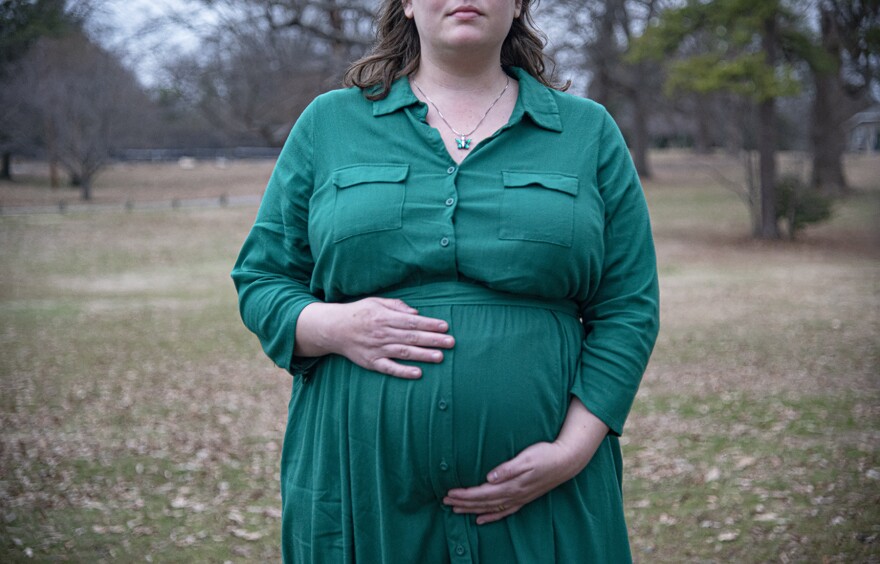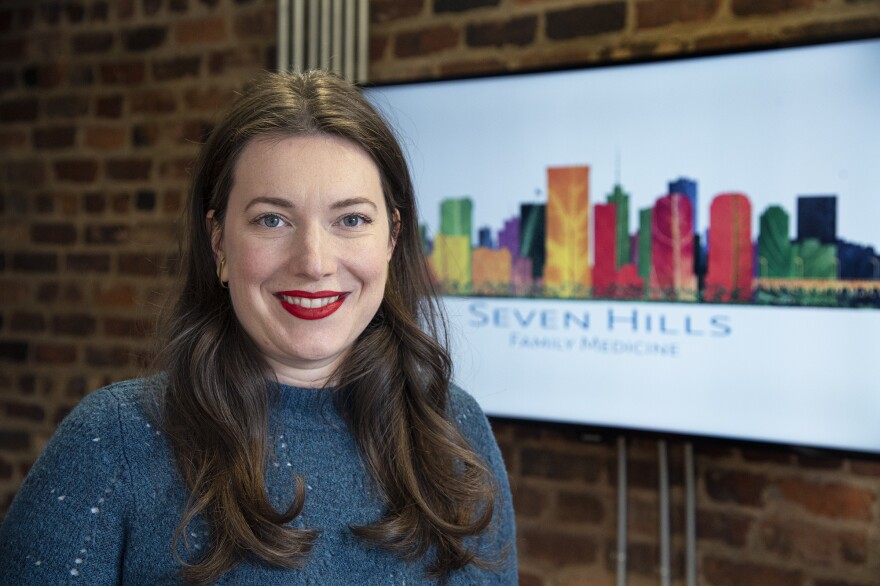For Henrico County resident Martha, the discussion about the proposed 15-week abortion ban is personal. VPM News is only using Martha’s first name because she fears retaliation from her employer for speaking publicly about her abortion.
It was the week of Christmas in 2021 when Martha found out she was pregnant. Just the day before, Martha and her husband moved into their first house. They very much wanted a baby, and soon started working on a nursery and thinking about names.
But around week six of her pregnancy, Martha contracted COVID-19 — even though she’d received a booster vaccine shot about a month before. She ended up developing a high fever and was ill for five days.
She would later be informed — when she was 20 weeks pregnant — that her baby girl had a birth defect, likely caused by the fever she had with COVID. Martha and her husband were told that Lynne — the name they’d settled on — had spina bifida, which can damage the spinal cord and nervous system. They were crushed.
“The anatomy scan is when we got handed the tissues and were told her spine never closed,” Martha said. “That was the worst day of my life.”
The condition meant that Lynne wouldn’t have been able to walk or go to the bathroom unassisted, would have had a skull the shape of a lemon and would’ve required treatment to drain fluid away from her brain, Martha said.
They’d learn even more about the seriousness of the situation the following week. Martha and her husband drove to the University of North Carolina, where they stayed at a Ronald McDonald House and met with a slew of doctors — a geneticist, surgeon, anesthesiologist and a spina bifida specialist — all in one day.
In-utero surgery a few weeks later was recommended, and Martha was told she’d have to stay at the Ronald McDonald House on bedrest for the remainder of her pregnancy. She learned that some children with spina bifida have had 42 surgeries before age 7.
“It was going to be a lifelong set of complications,” Martha said. “It was a lot to think about her first surgery being in utero or within hours of her life.”
Martha also joined support groups for parents of children with spina bifida to learn more.
But time was ticking, because according to VCU Health’s current hospital policy, abortions at or after 23 weeks are only performed “in cases of fetal impairment that is lethal or has a high likelihood of severe compromise of quality of life or to save the life of the mother.”
She and her husband were now faced with the impossible: deciding whether to move forward with the pregnancy or terminate it. They had less than a month to decide and were on the fence about it until the very end. But ultimately, Martha said it didn’t feel right to sign her yet-to-be-born daughter up for a life full of doctors’ appointments and surgeries.
“I would rather take on her life of pain than sign her up for the body that she was given,” Martha said. "You have parents who decide to have their children with spina bifida. It's an act of love. And it was an act of love that we chose to say goodbye to Lynne. But it's an act of love either way.”
The day before her scheduled 23-week abortion, the U.S. Supreme Court decision to overturn Roe v. Wade was leaked. Martha said it was like adding insult to injury. And now, the idea of a 15-week abortion ban in Virginia is equally upsetting.
She said it shouldn’t be up to politicians to decide whether Lynne should have lived.
“Whatever decision we came up with needs to be honored. It should only be my husband and I's decision,” Martha said. “I imagine politicians sitting there with a list of diagnoses to sort through which category is acceptable for termination for medical reasons. And a lot of bias goes into that.”
After losing Lynne, Martha said she and her husband decided they wanted to try to get pregnant again right away. They’re now expecting a baby boy in April — almost a year to the day that they got Lynne’s diagnosis of spina bifida.
Martha said pregnancy after loss is “always holding two extremes. It's holding joy and grief together — and excitement and horror.”

Del. Kathy Byron (R-Bedford), who is sponsoring the 15-week abortion ban bill, did not respond to interview requests about the legislation by deadline.
In addition to limiting abortions after 15 weeks of gestation, the bill would require abortions in the first trimester to be performed by a physician — and not a nurse practitioner. That would reverse 2020 legislation that allowed nurse practitioners — who must complete at least a master’s degree in nursing — to perform first-trimester abortions.
Virginia Gov. Glenn Youngkin supports the 15-week abortion ban and has claimed publicly that fetuses can feel pain at 15 weeks. The American College of Obstetricians and Gynecologists has stated, however, that fetuses can’t experience pain until at least 24-25 weeks.
“Every major medical organization that has examined this issue and peer-reviewed studies on the matter have consistently reached the conclusion that abortion before this point does not result in the perception of pain in a fetus,” according to an ACOG policy brief.
Youngkin has also claimed the measure would save lives, but opponents like Virginia League for Planned Parenthood Executive Director Jamie Lockhart say it can be deadly for pregnant people.
The bill includes a provision allowing abortions in cases where the pregnant person’s life or one of their “major bodily functions” is at risk. But Lockhart pointed out it specifically excludes psychological and emotional health — meaning abortion wouldn’t be permitted after 15 weeks even if it was determined that the pregnant person’s mental health would be substantially compromised.
Stephanie Arnold, a Richmond-based family physician who provides abortions, said doctors in states with similar bans are consulting lawyers to determine if a patient is close enough to death to provide the care they’ve determined medically appropriate — fearing a lawsuit, if they aren’t. The proposed 15-week abortion ban also adds a felony penalty for any providers who violate its provisions, which could mean 2-10 years in prison plus fines.
“We do not feel the need to legislate any other medical care. … We don't legislate who can or can't get dialysis or life support or emergency surgeries. Why are we legislating this? This type of ban is anti-family, it's anti-science,” Arnold said. “Governor Youngkin is trying to play doctor and play with people's lives. This is the kind of thing that kills people. And it's very disturbing.”

She said abortions that happen later during pregnancies — while rare — are done when interventions must be made for serious reasons. Virginia law already requires three physicians to certify that a pregnant person could be killed or have their physical or mental health substantially harmed before abortions can be performed during the third trimester, which begins around 27 weeks.
And, Arnold said, most people who decide to get an abortion want to get it done as early as possible — which is partly why more people have flocked to Richmond from neighboring states like North Carolina, where there’s a mandatory waiting period for abortions.
“When folks are fleeing states where there are restrictive abortion laws or all-out abortion bans, most of them cannot afford to fly to New York or Massachusetts,” Arnold said. “They are going to drive to the nearest possible place to get an abortion.”
Richmond’s location on I-95 makes it accessible for those coming from other Southern states, Arnold said.
“It has been very distressing for people," Arnold said. “We have had patients here who drove from Alabama to Georgia to try to get an abortion. And then they were right at six weeks, two days in the pregnancy, so too far to get an abortion in Georgia. And then, they have a family member who lives in Richmond who found us and so, they come up here to get their abortion procedure. So, lots of calls like that.”
The day before the Supreme Court decision overturning Roe v. Wade was leaked, Arnold met a colleague to talk about steps needed to open their own healthcare practice in Richmond. Arnold said she’s hoped to offer abortion care alongside primary care for a long time. They’d originally planned on a longer timeline to open — but felt the need to open as soon as possible to serve the community in light of the Dobbs v. Jackson decision.
“It all kind of immediately sunk in, like, ‘Oh, this is going to be bad. And it's going to be particularly intense here in a way that maybe people aren't anticipating,” Arnold said.
They immediately launched a GoFundMe to help them find a temporary office in Richmond until they’re able to purchase their own building. They’ve been open for about a month now, and Arnold, who currently provides abortion by pill up to 11 weeks, said they’ve already seen patients from other states seeking abortions.
“The fastest thing that we could do to get up and running was to offer the abortion by pill, but our next step is to bring on the in-office procedure through the first trimester, so 13 weeks and six days,” Arnold said. “And that's something that we have been getting a lot of calls about.”
Her practice, Seven Hills Family Medicine, does not accept insurance but instead operates with a monthly membership fee for all primary, gender-affirming and reproductive health care. The practice also offers abortion care to non-members for a fee. She pointed out there are organizations like the Richmond Reproductive Freedom Project that can help cover the costs of an abortion — which typically costs around $300-$600. They’ve also set up an equity fund to help lower some of the costs of care.
“This clinic is community-funded, and we want to make sure that we're making good decisions and taking care of people in the right way, and just really being equitable with everything that we're doing,” Arnold said.
VPM News wants to hear your responses to one question: What do you want to learn about the most during the 2023 General Assembly session?



